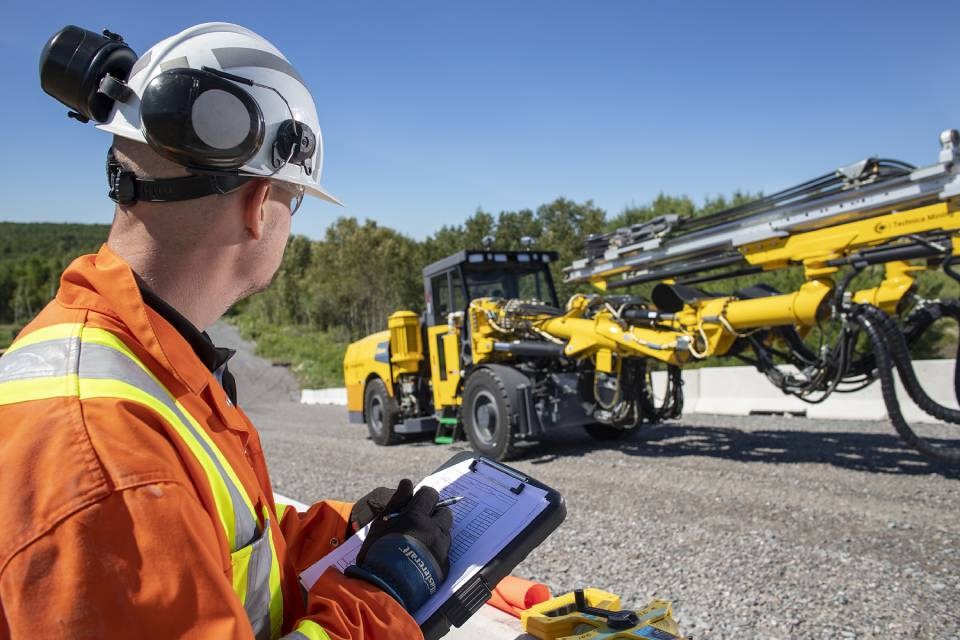Before it's ever driven underground, a mining vehicle needs to pass a brake test to ensure it’s resilient enough to withstand the rigours of a tough, rugged environment, and for years, Equipment North has performed those tests at an off-site facility.
But when COVID arrived and safety protocols restricted the movement of vehicles, the Sudbury company realized it had to come up with a new solution.
“We have property… so we said, 'We need to look at building a facility,” said Warren Cayen, the business development manager at Equipment North.
Last fall, the company built a brand-new ramp at its Lively property in the Fielding Industrial Park west of the city.
After making a few adjustments this spring, it officially opened for business in early June, and “the phone hasn't stopped ringing,” Cayen said.
“It seems to be something that was missing from the market for the mining industry for equipment development and certification, and it's definitely so far been a successful venture for us.”
Equipment North has been renting and selling equipment for the mining and construction industries since 1989. With technicians on call 24/7, the company services everything it rents or sells from its two locations in Sudbury and Timmins.
Cayen said safety remains at the forefront of everything it does.
“Equipment North has been committed to providing quality, safe equipment to the construction and mining industries for decades, and we're just looking at this as being an extension on how we're able to improve and continue to deliver that quality of service,” Cayen said.
Sign up for the Sudbury Mining Solutions newsletter here.
Under the Occupational Health and Safety Act, ramp testing is required for any vehicle being used underground for the first time, and testing procedures must meet standards set out by the Canadian Standards Association (CSA) and the International Organization for Standardization (ISO).
Nickel miner Vale has been conducting ramp tests at its Copper Cliff North Mine since the 1980s, both on equipment going into its own mines and for outside operators, Cayen said.
The company's standards are so stringent that, today, many in the industry still use the Vale model as the benchmark for safety.
“One of the first things a client asks is 'Does it have a ramp test?'" Cayen said. “What they really mean is 'Does it have a Vale ramp test?'"
Equipment North kept this in mind while creating its own facility, building to Vale's specifications and earning an endorsement from the nickel miner along the way.
The 200-foot ramp is built at a 20 per cent grade and has an extended landing so vehicles can come to a safe stop in case of equipment malfunction or brake failure.
Testing itself is an intensive process, which can take anywhere from an hour to four hours to complete, Cayen said.
The equipment is loaded with material to its maximum capacity and then driven down the ramp multiple times to ensure that the brakes work every time.
“It's a very rigorous testing that it goes through to put it to its maximum potential failure point to ensure that it works,” Cayen said.
Taking feedback from clients, the company is already making adjustments.
Typically, clients would arrive with their vehicle pre-loaded with material and ready for testing.
Now, however, Equipment North is planning to have material on site, so equipment can be loaded on arrival and unloaded once testing is completed.
“We can weigh the equipment, and then we can perform the test, and we can remove the material and they can be on their way, and we can complete the documentation and send it off to them, and everybody's happy,” Cayen said.
When the ramp isn't being used for testing, companies developing new products can rent the space to try out their prototypes and work out any bugs before the vehicles go to market.
Cayen expects this service will be in particularly high demand with the emergence of new technologies, such as battery-powered equipment.
With new technology comes a lot of unknowns, he said, and it's better to learn about the potential failures ahead of time than during an investigation after an accident has occurred.
“People work underground, they go to these jobs to provide for their families, and the most important thing is that they go home at the end of the day,” Cayen said.
“If we can do any testing and provide any kind of identification to equipment failure or potential failures prior to it getting into the workplace, it's even better for us.”
The Drift features profiles on the people, companies and institutions making important contributions to Greater Sudbury’s mining sector. From exploration, operation and remediation to research and innovation, this series covers the breadth of mining-related expertise that was born out of one of the world’s richest mining camps and is now exported around the world.
– SudburyMiningSolutions




